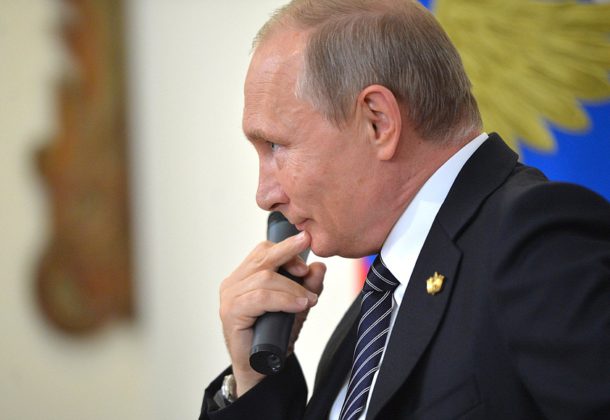Russian Foreign Affairs Expert: Trump Can Help Make Russia Great Again

Russia wants to be great again and a majority of Russians believe President Donald Trump can help. Using statistics, insights, and polling data, a high-ranking, Moscow academic and foreign relations expert presented those assessments at St. Mary’s College of Maryland last month.
The Patuxent Partnership and Center for the Study of Democracy invited Tatiana Shakleina to address the query, “US-Russian Relations under the Trump Administration: What does Russia Expect?” Ms. Shakleina is head of the Department of Applied Analysis of International Problems at the Moscow State Institute of International Relations of the Ministry of Foreign Affairs of the Russian Federation. Maija Harkonen, director of the Center for the Study of Democracy, introduced her fellow academic with whom she’s shared panel discussions around the world. Ms. Harkonen expressed respect for Ms. Shakleina, but noted they did not share a political philosophy.
Ms. Shakleina came quickly to a major point of friction between the nations. “Sanctions do not make Russian people happy.” For that reason, she said of opinion polls regarding the US election, 67 percent of Russians favored then-candidate Trump over Hillary Clinton. “Many people thought very favorably of Trump,” she said. “[They] expect Trump to lift sanctions.”
The US and European Union began imposing economic sanctions against Russia when it annexed Crimea in March 2014. As aggression into Ukraine continued, more sanctions were added. The sanctions block major US financial institutions from doing business with Russia and prevent US oil companies from making new deals with Russia. [ABC News] The sanctions have deepened an ongoing recession in Russia.
Ms. Shakleina said domestic hardships were acceptable to the people of Russia who support President Vladimir Putin’s efforts to restore Russia’s status as a super power and returning Russia to the world stage.
Although other nations might not see Russia’s prominence in the global future, “Russia doesn’t accept this view.” The people of Russia, she said, elected President Putin to “restore the historic tradition of being a leading world power. This is not his personal invention.”
Queried from the audience about occupation of Crimea, Ms. Shakleina said there was none. A knowledge of history would show Crimea always belonged with the Russian Federation and that the people of Crimea wished to remain Russian.
Crimea was initially and controversially transferred out of the Russian Soviet Federative Socialist Republic to the Ukrainian SSR in 1954. [Crimea History.org] [Wikipedia]
Ms. Harkonen, a native of Finland, which shares an 833-mile border with Russia and this year will celebrate the centennial of its independence from the Russian Republic, described two visits she had made to the Crimea as not quite so Russian in identity as described. Ms. Harkonen also said there were “any number of borders disputed around the world. There has to be willingness of both parties to discuss.”
“Crimea is a closed issue in Russian US conversations,” Ms. Shakleina said.
Geography allows the United States to remain distant from threats that are at Russian borders. At these “vulnerable” borders Russians are “afraid of spill over.” Violence of this scale is “not a direct and imminent threat for the US, separated by two oceans.”
Further distancing the US from seeing the imperative to Russia again playing a part in a China-US-Russia balancing of world order, is American’s limitation to information in English. “Our students study many languages,” including English. “They are very well informed about the US. I’m not sure what is read in the US. You do not have so many sources in English,” Ms. Shakleina said.
She rebuffed queries about the US freedom of the press. It is a “myth that Russia has none.”
“We cannot speak of free press in any country,” she said. The news is influenced by “owners, publishers, government.” By 1991, Russia had “freedom in full,” but it resulted in “illegal and criminal” television broadcasting including pornography which should be kept from children. “It was clear something had to be done,” she said, with no elaboration. Critical newspapers remain, she said, and students within an academic framework are free to say what they wish.
The way President Putin knows what his people want, Ms. Shakleina explained, is through opinion polling, the wide academic community, and the historical tradition of Russia. She cited polls indicating 30 percent of Russians want Russia to become a great power again and 30 percent believe Russia is already a great power.























